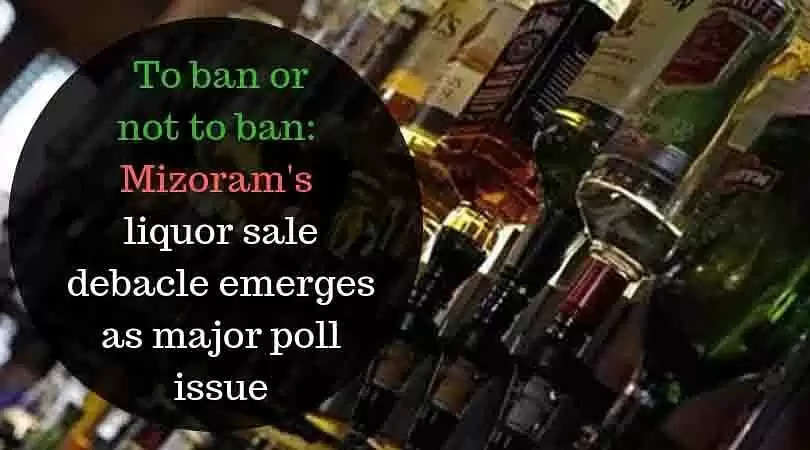To ban or not to ban: Mizoram’s liquor sale debacle emerges as major poll issue

AIZAWL, November 19, 2018: There are promises that are made in a poll season and most of them remain promises, but in the election season of this small hill state, all major political parties say they are serious when it comes to liquor – whether to ban it or not, and whether to ban it fully or partially.
Mizoram will vote on November 28 for 40 assembly seats to decide who will form the next government in this highly-literate and Christian-majority state.
The state has a total population of about 10 lakh people only, but elections here are being seen as very important for the Congress and and Mizoram National Party (MNF), who have ruled Mizoram ever since it it became a full-fledged state in 1987, as also for the BJP that sees it as the 'final frontier' in the North-East.
While the ruling Congress is against total prohibition, the main opposition MNF wants a complete ban.
The BJP has taken a middle path by proposing to ban the liquor coming from outside the state and encourage only locally produced ones.
When the state Chief Minister Lal Thanhawla was in office for his third term, he introduced the Mizoram Liquor Total Prohibition Act banning sale and consumption of alcohol effective from February 20, 1997.
In 2007, the Act was amended during the MNF chief minister Zoramthanga's rule to allow wine to be made from guavas and grapes, but with restrictions on the alcohol content and the volume possessed.
During Thanhawla's fifth term, Mizoram repealed prohibition on July 10, 2014.
The powerful Presbyterian Church had organised mass prayers in all member churches across the state twice that year against repeal of the prohibition.
The MLPC Act came into force from January 15, 2015, while the first wine shop under the new law was opened on March 16, 2015.
"Youths do not like total prohibition. MNF and ZPM (Zoram People's Movement) are for total prohibition. Congress can gain from this," Aizawl-based journalist-turned-entrepreneur Joseph Lalhriatpuia said.
According to the Mizoram Excise & Narcotics Department website, deaths due to liquor consumption have been on a rise from 9 in 2015 to 22 in 2016 and to 59 in 2017.
Mizoram BJP President J V Hluna said, "We will not import IMFL to Mizoram. Liquor consumption will not be banned, but locally produced liquor (will be allowed). We will legalise local products and export them too."
People's Representation for Identity and Status of Mizoram (PRISM), a new party contesting polls for the first time, said total prohibition is not a solution.
Favouring control than prohibition, PRISM leader said people need to be made aware about ill affects of liquor and some changes can be made in the MLPC Act.
Zoramthanga, Hluna and Vanlalruata also pitched for home-made rice beer or locally produced liquor.
MNF leader and candidate from Aizawl East-II constituency Robert Romawia Royte said gains for the state government from allowing liquor is less than the loss it causes.
Stating that liquor consumption is against the Bible, Royte further said: "Men are dying in Mizoram. Number of widows is increasing. We have a peculiar situation, where male voters are less than the women voters."
Mizoram has total 7.68 lakh registered voters – 3.74 lakh are men and 3.93 lakh are women. Except Mamit district, rest all seven districts – Kolasib, Aizawl, Champhai, Serchhip, Lunglei, Lawngtlai and Siaha – have higher number of female voters.
The Congress has been in power in Mizoram since 2008 and is eyeing the third consecutive term.
(PTI)

















